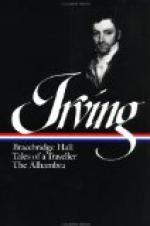A BIRTHDAY DINNER
“The Little Sons of the Rich” were gathered about the long table in Pettingill’s studio. There were nine of them present, besides Brewster. They were all young, more or less enterprising, hopeful, and reasonably sure of better things to come. Most of them bore names that meant something in the story of New York. Indeed, one of them had remarked, “A man is known by the street that’s named after him,” and as he was a new member, they called him “Subway.”
The most popular man in the company was young “Monty” Brewster. He was tall and straight and smooth-shaven. People called him “clean-looking.” Older women were interested in him because his father and mother had made a romantic runaway match, which was the talk of the town in the seventies, and had never been forgiven. Worldly women were interested in him because he was the only grandson of Edwin Peter Brewster, who was many times a millionaire, and Monty was fairly certain to be his heir—barring an absent-minded gift to charity. Younger women were interested for a much more obvious and simple reason: they liked him. Men also took to Monty because he was a good sportsman, a man among men, because he had a decent respect for himself and no great aversion to work.
His father and mother had both died while he was still a child, and, as if to make up for his long relentlessness, the grandfather had taken the boy to his own house and had cared for him with what he called affection. After college and some months on the continent, however, Monty had preferred to be independent. Old Mr. Brewster had found him a place in the bank, but beyond this and occasional dinners, Monty asked for and received no favors. It was a question of work, and hard work, and small pay. He lived on his salary because he had to, but he did not resent his grandfather’s attitude. He was better satisfied to spend his “weakly salary,” as he called it, in his own way than to earn more by dining seven nights a week with an old man who had forgotten he was ever young. It was less wearing, he said.
Among the “Little Sons of the Rich,” birthdays were always occasions for feasting. The table was covered with dishes sent up from the French restaurant in the basement. The chairs were pushed back, cigarettes were lighted, men had their knees crossed. Then Pettingill got up.
“Gentlemen,” he began, “we are here to celebrate the twenty-fifth birthday of Mr. Montgomery Brewster. I ask you all to join me in drinking to his long life and happiness.”
“No heel taps!” some one shouted. “Brewster! Brewster!” all called at once.
“For he’s a jolly
good fellow,
For he’s a jolly
good fellow!”
The sudden ringing of an electric bell cut off this flow of sentiment, and so unusual was the interruption that the ten members straightened up as if jerked into position by a string.




